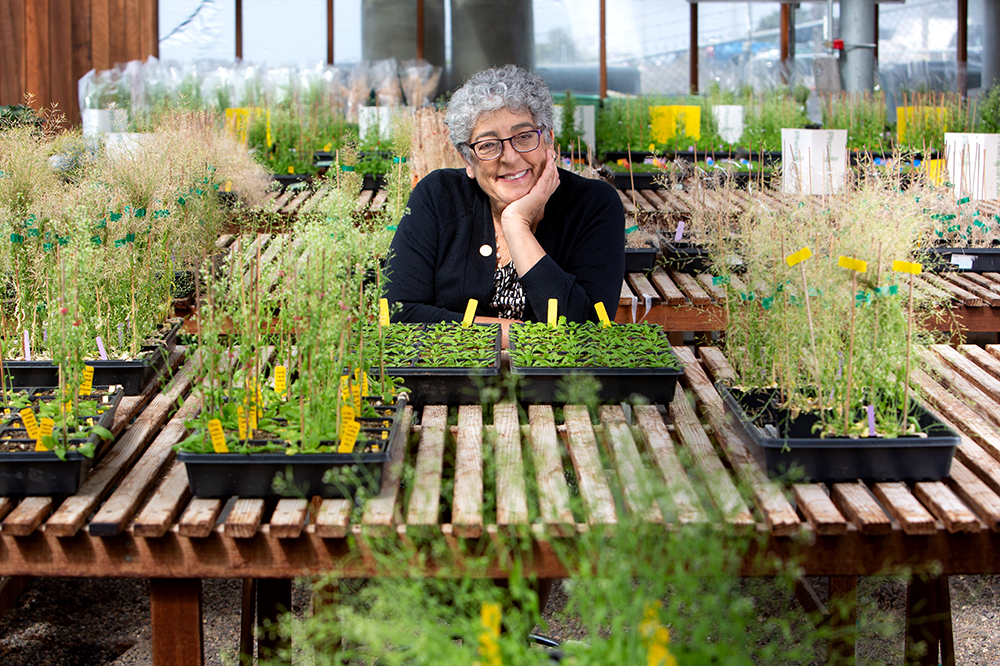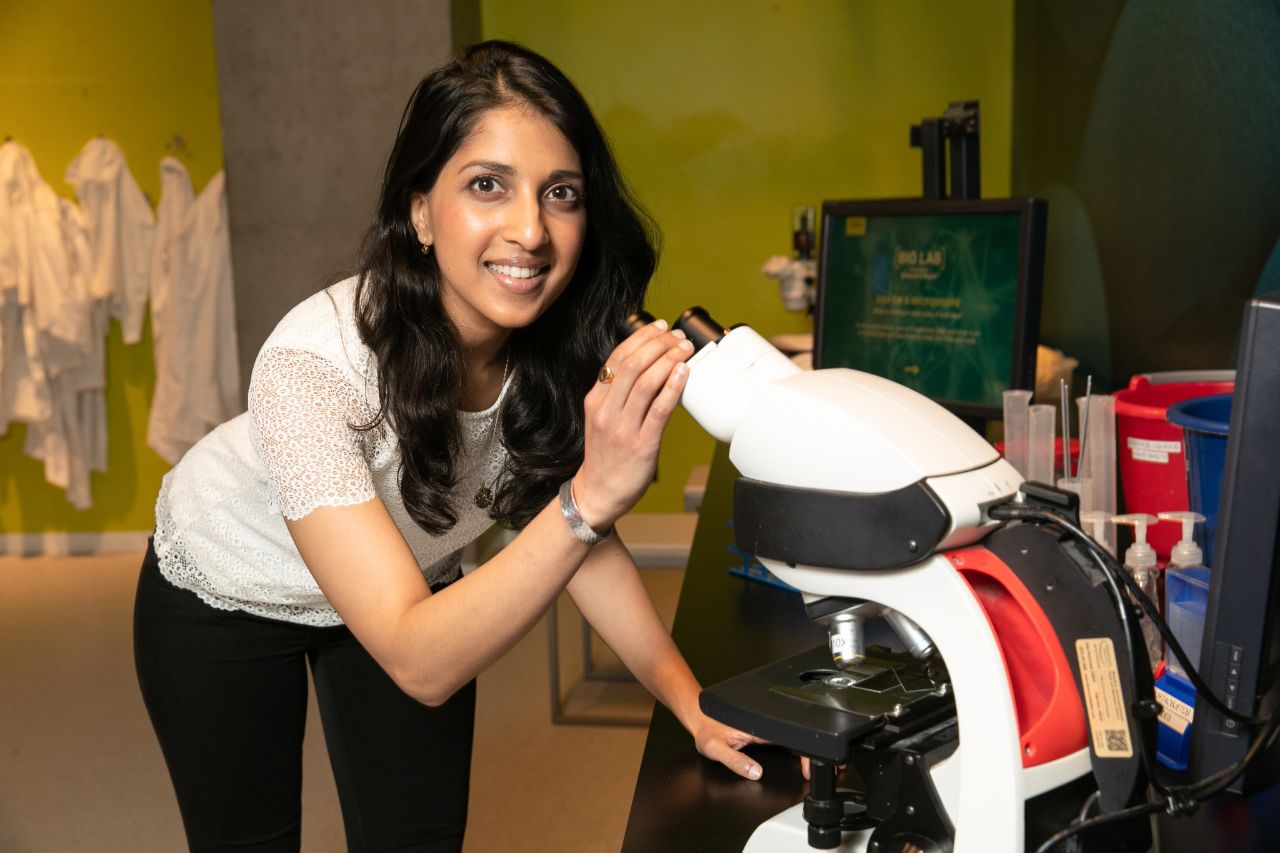RFS Briefings - October 14, 2020Dear Colleagues, I am pleased to include another issue of RFS Briefings with some timely and encouraging updates on women in science. Mark your calendar for Friday, October 16th. We will be hosting our first Women in Science Webinar with Genetic Engineering & Biotechnology News. British biologist and author Dr. Matthew Cobb will explore Rosalind Franklin’s contributions to DNA structure and how they have been seen in popular culture. He will equally focus on the other periods in her life, highlighting the insights they provide us into the mind of one of the 20th century’s greatest scientists, one who would have celebrated her hundredth birthday this year. Register today! 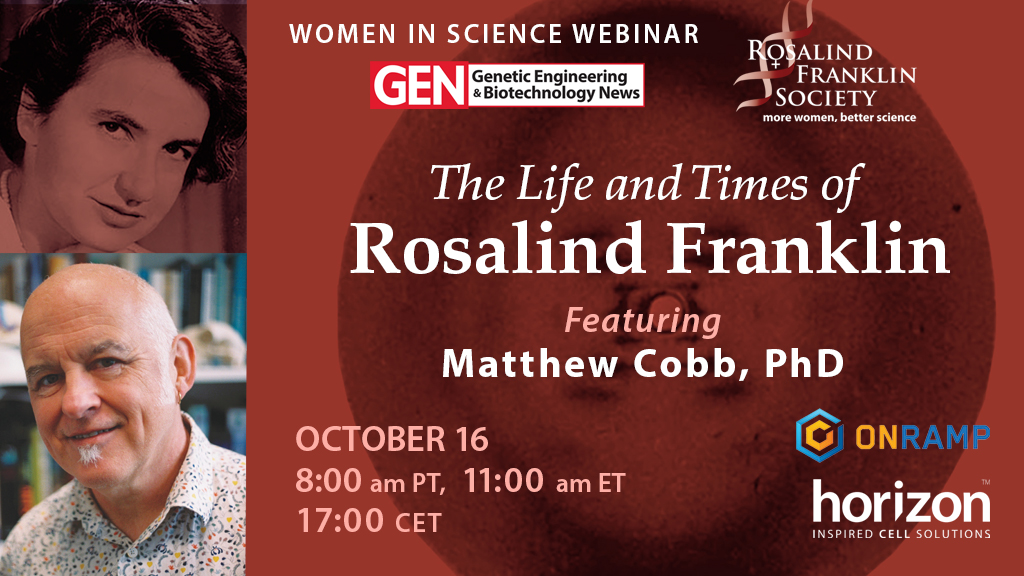
This is the first of a 3-part series on women in science. Stay tuned for the upcoming events:
Many congratulations to Emmanuelle Charpentier and Jennifer Doudna for winning the 2020 Nobel Prize in Chemistry! 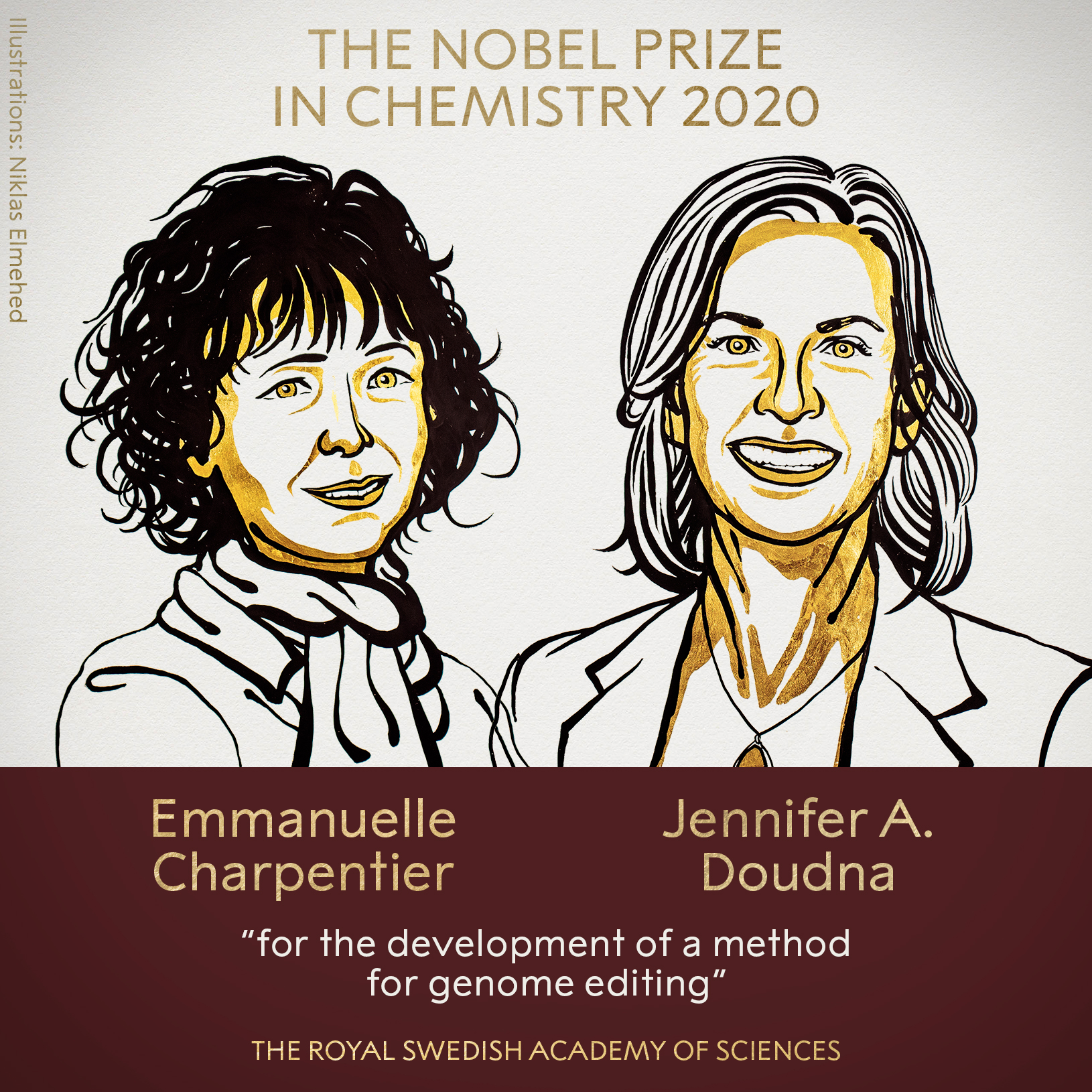 Image: The Nobel Prize on Twitter. The award went jointly to Emmanuelle Charpentier of the Max Planck Unit for the Science of Pathogens and Jennifer Doudna of the University of California, Berkeley, “for the development of a method for genome editing.” They first showed that CRISPR could edit DNA in an in vitro system in a paper published in the 28 June 2012 issue of Science. This is exciting news not only because of the applications of CRISPR in medicine, agriculture, and biotechnology in general but because this is the only science Nobel ever won by two women! In a press conference, Doudna said: "It’s great for especially younger women to see this and to see that women’s work can be recognized as much as men’s. I think for many women, there’s a feeling that no matter what they do, their work will never be recognized as it might be if they were a man. And I’d like to see that change, of course, and I think this is a step in the right direction." Here are some interesting articles covering the 2020 Nobel Prize in Chemistry:
Jennifer Doudna was a featured speaker at our RFS Board Meeting. Check out her presentation: https://youtu.be/UG0xMxEL1Ps We also congratulate UCLA professor Andrea Ghez for winning the 2020 Nobel Prize in Physics for her pioneering research on the Milky Way’s supermassive black hole! 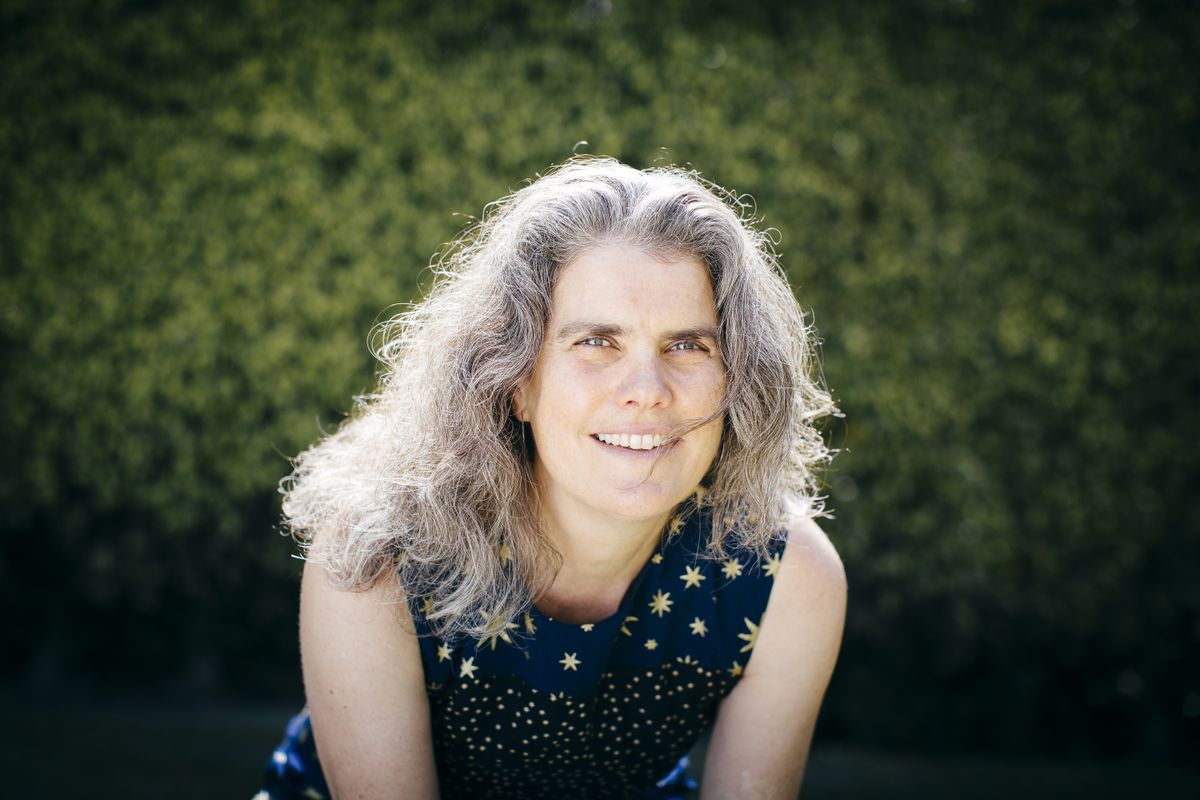
Andrea Ghez, UCLA’s Lauren B. Leichtman and Arthur E. Levine Professor of Astrophysics, has been awarded the 2020 Nobel Prize in physics. Congratulations to Joanne Chory, the Howard H. and Maryam R. Newman Chair in Plant Biology and director of the Plant Molecular and Cellular Biology Laboratory at The Salk Institute, for receiving the 2020 Pearl Meister Greengard Prize, Rockefeller’s preeminent award recognizing outstanding women scientists. She pioneered the application of molecular genetics to plant biology and transformed our understanding of photosynthesis. In 2019, her research lab received a $35 million award from the TED Audacious Project for their groundbreaking efforts to combat climate change.
See below for more news about women in science Please continue to share important news and opportunities with us so that we may share it with you, and others who are committed to supporting the careers of exceptional women in science. With regards in these trying times,
NewsMerck KGaA names Garijo CEO, punching another hole in biopharma's glass ceiling. Belén Garijo, currently head of Merck Healthcare, is getting a big promotion and will become Merck KGaA's new CEO in 2021. She is the second woman CEO to take the reins at a Big Pharma company: the first was Emma Walmsley, who took up the top job at GlaxoSmithKline in April 2017. According to a recent survey by the Biotechnology Innovation Organization, women make up 30% of executive teams among the organization’s members, which include many small companies that employ less than 100 people. 
Belén Garijo, Vice Chair of the Executive Board and Deputy CEO of Merck KGaA, Darmstadt, Germany | CEO Healthcare. Mothers in Science is an international non-profit organization that advocates for equity and inclusion of parents and people with caring responsibilities in STEM, with the ultimate goal of increasing the participation and retention of women in STEM careers. They are conducting a survey to help raise awareness of the current challenges of combining work and family life in STEM, particularly for women. Take the survey on https://www.mothersinscience.com/survey Senators introduce bipartisan bill to help women, minorities get STEM jobs. Sens. Jacky Rosen (D-Nev.) and Cindy Hyde-Smith (R-Miss.) introduced the bipartisan STEM RESTART Act to fund returnships for workers who have either left the STEM workforce, or who want to transition into the field. The bill would provide $50 million in grants to employers looking to hire underrepresented groups in STEM, including women, Black and Latino workers and individuals from rural areas. The Nobels overwhelmingly go to men — this year's prize for medicine was no exception. The Nobel Prize in medicine and physiology was awarded this year to Harvey J. Alter, Michael Houghton and Charles M. Rice, who showed that chronic liver inflammation was caused by a virus, hepatitis C. Between 1901 and 2019, 219 individuals have been awarded the Nobel Prize in medicine, and only 12 of them were women, about 5.5%, according to NPR. Nina Jing awarded the Blavatnik Regional Award for Young Scientists in Chemistry. Ning Jia, a postdoctoral fellow at the Memorial Sloan Kettering Cancer Center in New York, has unlocked key biological mechanisms that govern the function of enzymes and CRISPR-Cas systems, such as those used in gene editing. New Arizona State University research center promotes inclusive STEM education. The new center will identify inequities that exist in classrooms across the university and conduct innovative research on ways to make undergraduate STEM classrooms more inclusive. Their work is meant to not only improve inclusivity within the ASU community, but also inspire change at institutions nationwide. The founders of the center, Sara Brownell and Kristen Parrish, developed a series of virtual events to help promote awareness and provide information around what it means to be anti-racist. OpportunitiesSubmit your abstract and present your work to global audiences at the upcoming "Asthma: New Discoveries in the Age of Pandemics" eSymposia. Scholarship opportunities are available for students and post-doctoral fellows to attend for free. The meeting will explore the intersection between inflammatory airway diseases like asthma, and COPD, with COVID-19 respiratory infection, examining overlapping symptoms and disease pathology to inform therapeutic insights. You have a few days to submit your nominations for the prestigious 2021 Szent-Györgyi Prize for Progress in Cancer Research. Candidates must have made an original discovery or breakthrough in scientific understanding that has led to better prevention, earlier diagnosis, or new treatments for patients with cancer. The deadline for nominations is October 15, 2020. Call for award applicants: Johnson & Johnson is accepting applications for its 2021 Women in STEM2D (WiSTEM2D) Scholars Award. The award honors women scholars working in science, technology, engineering, math, manufacturing and design with a $150,000 grant and three years of mentorship. The deadline for applications is October 15, 2020. Ideas3 Questions: Nancy Hopkins on improving gender equality in academia. How can academia better support underrepresented groups in science moving forward? “You have to do what MIT did: look at the data; make corrections, including policy changes if necessary; continue to track the data to see if the policies work; and repeat as needed. Second, as the National Academies report points out, you must reward administrators who create a diverse workplace. Top talent is distributed among diverse groups. You can only be the best by being diverse,” says Hopkins in an interview for the MIT News. The Young Scientists Journal, the world's peer reviewed science journal written and edited exclusively by 12-20 year olds, posted a series of articles as part of the Rosalind Franklin day. Articles include: “The Role of AI in Gene Technology,” “Tissue Engineering, Organoids and Genetic Diseases,” “RNAi Mechanism and Applications,” “Martha Chase: The Underappreciated Geneticist,” “How the Genome Proves That SARS-Cov-2 Arose Naturally,” and more. The virus moved female faculty to the brink. Will universities help? Covid-19 continues to exacerbate already existing gender inequities. Supporting women in academia cannot be overlooked, according to The New York Times. Arctic expedition’s dress code raises concerns about sexism in science. The dress-code policy of a prominent polar research institute in Germany has provoked criticism and outrage after it was recently made public, with some experts saying it underscored the problem of sexism in the sciences, according to The New York Times. “The implication that many people took from those meetings was that women should change the way they dress in order to manage the behavior of men aboard the ship,” said Chelsea Harvey, a journalist who was on the ship. Women in STEMCongratulations to the Black women microbiologists featured in The New York Times, including Ariangela Kozik, Kishana Taylor, Kizzmekia Corbett, Taylor Smith, Chelsey Spriggs, Johnna Frierson, and LaNell Williams. Read about their experiences in science and why they led #BlackInMicro, a week of talks, panels and discussions celebrating black microbiologists. You can now watch the videos on YouTube. Ritu Raman, a postdoctoral fellow at MIT in the research group of Robert Langer, has been honored with the 2020 MRS Bulletin Postdoctoral Publication Prize. “As a biohybrid engineer, my scientific goal is to understand how we can build with living and nonliving materials in synchrony and to build adaptive medical implants that dynamically sense and respond to the human body,” said Raman. “I envision a world where biological building blocks, like living cells, are part of the toolbox of every materials scientist, but this requires engaging and accessible science communication.” Ritu was a speaker last winter at the RFS Colloquium at the Wistar Institute. Professor Susan Kaech, Salk Institute scientist, discusses vaccine updates on NBC. She doesn't believe we will have a vaccine by next month, and the results of the clinical trials have to be statistically significant to ensure that there is a certain level of confidence for how well the vaccine will protect a population. Celebrate Women in Science by tuning into this season of Breakthrough Films: Discover the innovative research and deeply personal stories of six women working at the forefront of their STEM fields: Kayla Iacovino, Volcanologist and Experimental Petrologist, Jingmai O'Connor, Paleontologist, Bianca Jones Marlin, Neuroscientist, Burçin Mutlu-Pakdil, Astronomer, Africa Flores-Anderson, National Geographic Explorer, and Audrey Dussutour, Animal Behavior Scientist. Breakthrough is a short film anthology from Science Friday and Howard Hughes Medical Institute (HHMI). How a brilliant biologist was failed by science. Roger Arliner Young, the first black woman to publish a paper in the prestigious journal Science, and the first black woman in the US to hold a doctorate in zoology, was a “real genius in zoology” according to her mentor and eminent biologist Ernest Everett Just. But her life and career was cut short by systemic racism and sexism in science and academia, writes Leila McNeill in an article for BBC Future. To promote gender equality in STEM in Brazil, C&EN and CAS, a division of the American Chemical Society, have awarded the 2020 Brazilian Women in Chemistry and Related Sciences award to three women scientists in Brazil. Denise Ferreira, CAS’s country manager for Brazil, said: “The contribution of women in the field of chemistry, an area that is strongly dominated by men, needs to be reinforced and awarded. These women are examples of leaders in the sciences to be followed by future generations.” Obituaries Conservation biology icon Georgina Mace dies at 67. Dame Georgina Mace was involved in some of the largest biodiversity projects on the planet. She led the scientific work that determined categories and criteria that sort species’ survival from least concern to extinct, with the International Union for the Conservation of Nature (IUCN) Red List. Renée C. Fox, founding figure of medical sociology, dies at 92. “Professor Fox was among the first to use the principles and methods of sociology to examine medical care and training, and to shed light on the social contexts of health and illness. Her work was informed by her experience with polio as a teenager, and her extensive travels and research in Africa, Asia and Europe,” writes Neil Genzlinger for The New York Times.
Marianna Limas, Social Media Manager
|

